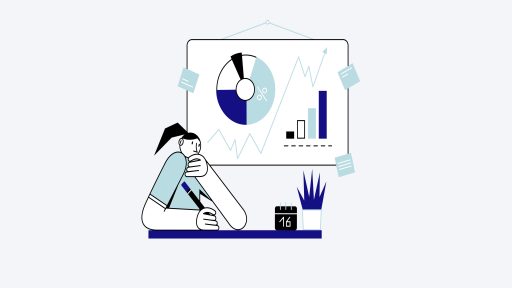Concerned about the viability of SEO nowadays? Think again! Discover the evolution of SEO and the reasons why it remains crucial for attracting natural traffic to your website.
If your target audience still depends on search engines featuring organic results that can be influenced through SEO, then SEO is far from being obsolete.
Here’s a visual representation to emphasize this point:

So… why do people continuously assert otherwise?
Let’s delve into the matter.
Table of Contents
- Difficulty in ranking desired pages
- Challenges in ranking within certain niches
- Need for updated SEO techniques
- Decline in click-through rates from search results
“I can’t rank the pages I desire to rank”
Many individuals claim that SEO is obsolete because they face increased challenges in ranking the type of content they desire for high-volume terms.
For instance, let’s consider a scenario where you are selling air fryers. Naturally, you would aim to have your product or category page rank for a popular term like “air fryer,” correct?
An analysis using Ahrefs’ Keywords Explorer of the 2015 SERP for “air fryer” clearly demonstrates the feasibility back then. The top results comprised individual product pages.

However, a glance at the present-day SERP tells a different tale. Apart from a product category page from Amazon, all other results are blog posts highlighting top recommendations.

Why did this change occur?
The shift in search intent over time may be a contributing factor. Alternatively, it’s more plausible that Google has enhanced its comprehension of search intent.
Regardless, it’s evident that individuals searching for terms such as “air fryer” now expect to see product recommendations, leading to Google’s current ranking priorities.
Does this indicate the demise of SEO?
No, it simply poses greater challenges. Achieving success in SEO now demands a heightened focus on aligning content with search intent unlike ever before.
For instance, aiming to rank for “air fryer” might be easier with a blog post outlining top picks than with a product or category page. Conversely, targeting “stainless steel air fryer” might favor a product category page for better outcomes.

Find out more: Searcher Intent: The Neglected ‘Ranking Element’ You Should Focus On
“I can’t rank at all in some specific sectors”
Another common argument about the obsolescence of SEO involves the growing difficulty in ranking within particular niches.
Consider the estimated organic traffic trend of a niche health website over recent years:

The visible drop in traffic in 2018 from an estimated 240K monthly searches to almost zero illustrates a significant decline.
This isn’t an isolated incident. Numerous niche site owners have witnessed a substantial decrease in traffic to their profitable niche sites in recent times due to various factors.
Why did this downward trend occur?
In certain niches, increased competition plays a significant role. However, in many cases, Google’s emphasis on E-A-T has been a key influencer.
E-A-T stands for expertise, authoritativeness, and trustworthiness, which are part of Google’s Search Quality Rater Guidelines aiding quality raters in evaluating search result quality.
The emphasis on E-A-T is evident from its mention over 130 times in the document.

As a side note, Google has now appended “Experience” to E-A-T, forming the less catchy acronym E-E-A-T, but for now, we’ll stick with E-A-T.
Essentially, E-A-T holds the most significance in “Your Money or Your Life (YMYL)” subjects, defined by Google as topics that could have a substantial impact on people’s health, financial stability, safety, societal welfare, or well-being.
Consequently, it has become exceedingly challenging for smaller entities to rank for YMYL topics, with dominance in YMYL SERPs now mainly reserved for prominent brands and governmental bodies.
Examining the results for “high blood pressure symptoms” confirms this trend:

Every search result is authored by a medical professional and originates from a government or non-profit organization. Consequently, it is highly unlikely for an individual blogger lacking formal medical expertise to secure a rank in this context.
This scenario isn’t limited to just “hardcore” medical topics.
A decade ago, I secured the top spot for “best protein powder” with a modest article on a freshly launched blog. However, a glance at today’s SERP highlights the dominance of renowned brands in the rankings.

Does this signify the extinction of SEO?
No, it just signifies increased complexity. Success in ranking for lucrative YMYL topics hinges on having E-A-T.
While the SEO community debates the specifics of E-A-T, Google’s Gary Illyes has suggested that E-A-T is largely influenced by links and mentions from authoritative sources.
https://twitter.com/Marie_Haynes/status/966325146968559616
While this may hold truth, one must consider how websites manage to acquire such links and mentions in the first instance.
For instance, attempting to rank for a valuable medical term like “best diet pills” would necessitate content endorsed or reviewed by a medical professional to attract links and mentions from authoritative sources, emphasizing the role of “expertise.”
Given the cost and effort involved in generating such content, ranking in these niches is undoubtedly more demanding and resource-intensive than before.
Find out more: What Is E-A-T? Why It’s Important for SEO
“I can’t rank using the same strategies as previously”
Some people argue that SEO is dying because the tried-and-true SEO tactics are no longer effective.
This assertion holds merit. Consider my previous example. . .
of positioning for “top protein powder.” Back in 2012, achieving the top spot only required a couple of mediocre guest articles. Additionally, I successfully elevated the ranking of that same website for a profitable affiliate term by seeking a backlink from The Huffington Post through a friend.

Aside.
Back then, HuffPo links were not marked as nofollow. Nonetheless, it’s astounding that this was all it needed.
It would be significantly more challenging to manipulate the system and secure rankings in present times.
What led to this outcome?
Google has improved its ability to detect the tactics employed to influence the SERPs. Simply put, it now can often identify when your links are purchased, your content lacks originality, or your user experience is subpar. This renders rankings less superficial than in the past.
On Twitter, Google’s John Mueller emphasized that this is the way things should be:

Does this imply that SEO is obsolete?
No. It’s simply more demanding. To secure a spot on Google’s rankings nowadays, your content must genuinely merit it. Additionally, you must be prepared to go through some challenges to convincingly demonstrate to Google that this is the case.
You should:
- Acquire high-quality backlinks instead of resorting to acquiring low-quality ones.
- Create unique content rather than simply regurgitating what the top-ranking pages already convey.
- Deliver an exceptional user experience as opposed to putting up any basic website.
Discover more: Tips for Enhancing Google Ranking
“Search Results are No Longer Getting Clicked”
There are assertions that Google is undermining SEO by securing clicks with direct answers in the SERP.
For instance, take a look at the SERP for the query “who played russ on friends”:

Given that the response is readily available, it’s reasonable to assume that most users may not bother clicking.
Data from Tenten’ Keywords Explorer supports this claim. Despite an estimated 1.2K searches monthly in the U.S., there is an average of only 0.35 clicks per search.

What caused this trend?
Google enhances its usefulness for users by furnishing answers directly on the SERP. It’s as straightforward as that.
Does this signify the death of SEO?
No. You simply need to prioritize keywords that cannot be promptly answered within the SERPs if you aim for organic clicks.
For instance, while Google addresses inquiries regarding “how do search engines work” directly on the SERP, it does the same for “who played russ on friends.” However, does that brief paragraph provide a thorough understanding of how search engines operate, or does it necessitate clicking for further information?

Based on the data from Keywords Explorer, it seems to be the latter. There are on average 0.84 clicks per search.

Comprehending how search engines function in a few sentences is a challenge. It’s a complex subject that demands detailed explanation. Consequently, keywords of this nature are somewhat resilient to Google’s attempt to act as an answer engine.
Nevertheless, it’s worth mentioning that certain SERP elements, like featured snippets, can present opportunities. This is because Google typically extracts the snippet from a top 10 result, allowing you to potentially leapfrog to the top of the SERP by securing the featured snippet.
Here’s a quick method to identify easily attainable featured snippet prospects on your site:
- Input your domain into Site Explorer
- Navigate to the Organic keywords report
- Filter for keyword rankings between positions #1-10
- Filter for featured snippets where your target isn’t ranked
This will reveal pages ranking on the first page of your site where a featured snippet is unclaimed.

The exact method used by Google to select the featured snippet is uncertain. The optimal strategy is to evaluate the existing snippet and strive to offer a more eloquent response on your page (in a similarly concise manner).
Although it might seem counterintuitive since you desire clicks, securing the top spot in the featured snippet is likely to generate more clicks compared to being ranked #8 as a standard “blue link” result.
Find out more: Tips for Optimizing Google’s Featured Snippets
Concluding Remark
SEO is still relevant as users continue to utilize search engines with organic search outcomes that can be influenced through SEO efforts. It’s just more demanding now due to the reasons outlined above.
Nonetheless, this isn’t necessarily negative. It simply means that you must select your battles wisely and stay attuned to discern what strategies are effective for the future.


